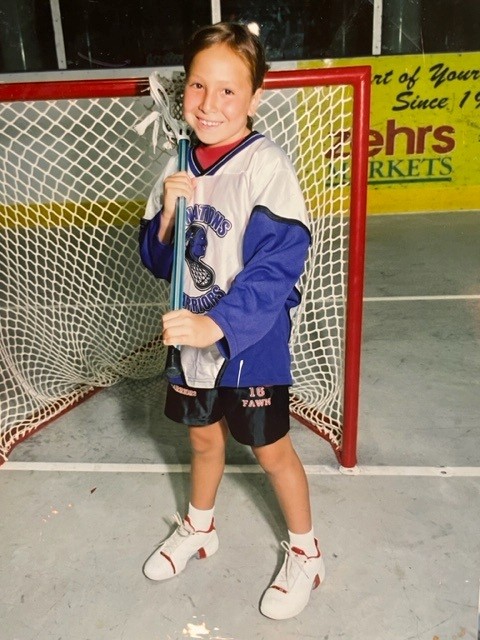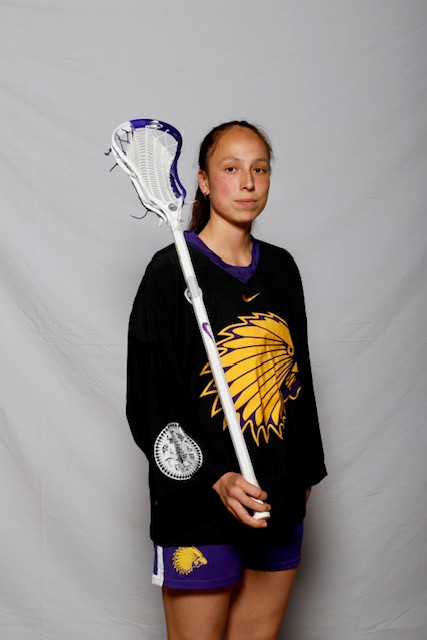From cultural connection to a world-class champion
Alum Fawn Porter blends Haudenosaunee identity with athletic excellence.
By Manreet Birdi
Growing up in a traditional Haudenosaunee family with strong ties to ceremony and identity, Fawn Porter, BSc’20, Wolf Clan member of the Cayuga Nation, was always taught that lacrosse was invented by the Indigenous Peoples.
“When I found out that lacrosse is originally an Indigenous sport, it made me feel like I was a part of something bigger,” says Fawn. “I believe the sport is played to honour the Creator, and that helps me stay grounded.”
In September 2024, Fawn Porter was named the first captain of the Haudenosaunee National Women’s Box Lacrosse team. Soon after, the team won their first-ever World Lacrosse championship medal and the first-ever Haudenosaunee women’s medal.
Although inspired to be the inaugural team captain, she never put too much focus on winning. “My biggest goal was to make the team experience memorable for all players. I wanted the team to be confident and happy and feel like they’re gaining skills and knowledge. It’s never been about winning. It’s about being your best self.”
From humble beginnings
A competitive person by nature, Fawn’s father enrolled her into box lacrosse as a child and she took to it right away. However, it did not come without barriers.

In Haudenosaunee culture, lacrosse is a ceremonial tradition and was historically a very rough game that could lead to serious injury. Traditionally, the sport was only played by men.
Challenged by her grandmother’s traditional belief system regarding women in sport, Fawn had to show her grandmother the value of women in athletics. Fawn expressed how important lacrosse was to her and explained she was not in it to win but to “spread the medicine of playing with a ‘good mind’”. A good mind means a spiritual and peaceful state of mind obtained through a strong connection to the Creator.
“After a long talk with my grandmother, she finally understood that I will always play the game how it’s intended for my team and for my community,” says Fawn.
From good to great
As a past student-athlete at Western, Fawn gained the skills she needed to create her competitive edge and bring her to the world stage. However, the transition from playing as a child on the reserve to becoming a world champion athlete came with some challenges.
After playing at home for most of her life, joining the Western Mustangs Women’s Lacrosse team in 2016 was a humbling experience. The team was at the top of the Ontario University Athletics (OUA) rankings, and success meant athletes had to follow strict rules and rigorous training regimens. Fawn didn’t quite realize what she had signed up for, however she credits her time at Western with preparing her for her future as a high-level athlete.
“You really have to prove yourself when you are a Mustang,” says Fawn. “Western developed me into a real athlete. I give them a lot of thanks for providing me structure and discipline.”

As a Western Mustang, Fawn was named an OUA Lacrosse First Team All Star during her fourth year. After graduating, she was part of the Team Haudenosaunee Lacrosse Sixes that beat Team Canada in 2022. They went on to win gold in the Pan-American Lacrosse Association (PALA) cup in Jamaica in 2023, before moving onto the world stage for box lacrosse.
She credits her mentors, including her family, her partner and her coach Tom Bomberry, for pushing her to excel in what was originally a male-dominated sport and helping her transform from “a good player into a great player”.
The future of Indigenous People in sports
On January 17, 2025, the United States and Canadian governments called on the International Olympic Committee (IOC) to allow the Haudenosaunee Confederacy to compete in the 2028 Los Angeles Olympics under their own flag. The two countries issued a joint statement saying:
“While participation in the Olympics is generally reserved for recognized countries, the Haudenosaunee are seeking a special exception from the IOC to field their own lacrosse team. Given the unique and exceptional circumstances of the Haudenosaunee’s historic connection to this sport, and their Men’s and Women’s teams continuously ranked participation in international competitive lacrosse for almost half a century, we believe that a narrowly scoped exception is appropriate.”
For Fawn, this new exception means getting closer to sitting at the bigger table in the world of sports.
The statement encourages the IOC to take advantage of this historic opportunity, which would send a powerful message about respecting and valuing Indigenous culture and heritage. For Fawn, it’s about improving the future for onkwehowe (original people).
“It would be absolutely huge going from being a little kid playing lacrosse on the Rez, to playing in the Olympics. We are doing this to let the world know that we exist and build a foundation for the next generations of Indigenous athletes.”

